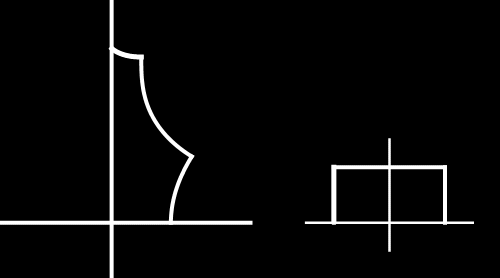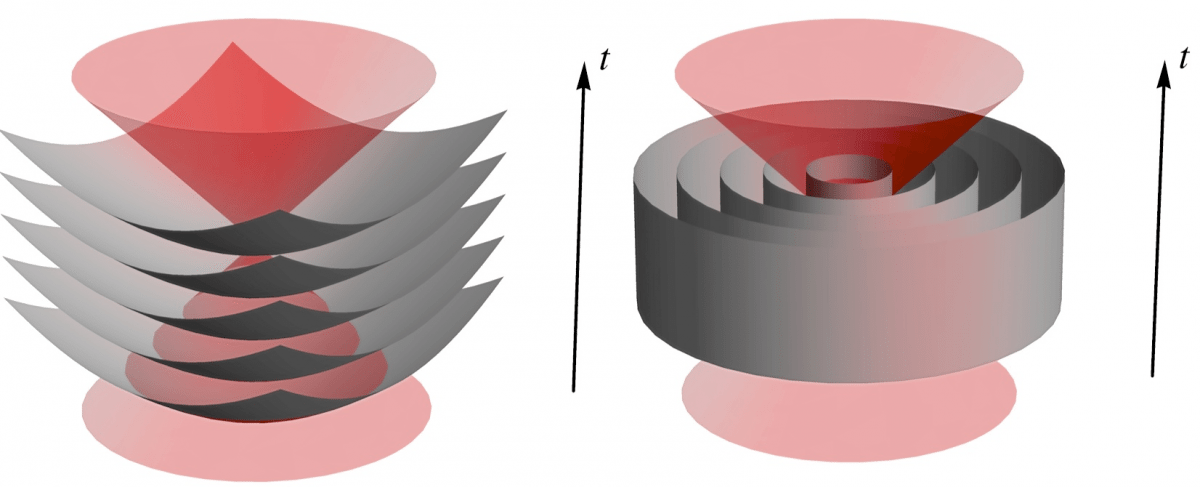While general relativity is a strongly verified model of gravity, it does have some theoretical problems. One of the biggest is the fact that it can’t be quantized in the way that other models can. As a result, the current state of physics has quantum theories for the fundamental forces of electromagnetism, and the strong and weak interactions, while gravity remains stuck in a largely classical regime. As a result there have been a great deal of effort to develop a quantum theory of gravity. Perhaps the most famous effort is string theory, but an alternative is an extension of general relativity known as conformal gravity.

An example of a conformal transformation. Credit: MathGifs.
At a basic level, general relativity is based upon a set of mathematical symmetries. Starting with the equivalence principle, which states that all objects fall at the same rate regardless of their mass, relativity proposes that the laws of physics should be the same regardless of your frame of reference. If you move from one position to another (translation), change your orientation (rotation) or change your speed (Lorentz boost), the laws of physics should be the same. In mathematics we would say our equations are invariant under these kinds of transformations. A basic consequence of these symmetries is that the vacuum speed of light is the same in all reference frames. Conformal gravity adds another symmetry known as the conformal transformation. An example of a conformal transformation would be to warp a two-dimensional sheet while preserving the angles of your coordinate grid. The upshot of such a transformation is that it preserves all the local properties of regular relativity while allowing a change in the global structure. By adding this symmetry, the hope of conformal gravity is that you could map the spacetime of relativity into a form that could be quantized, thus producing a quantum theory of gravity.
Because conformal gravity is an extension of general relativity, it keeps Einstein’s theory as an approximation. Conformal gravity agrees with all the usual tests of relativity such as Mercury’s orbital precession, the gravitational deflection of light, and gravitational redshift. However its global structure is different, which gives it testable predictions. For one, conformal gravity doesn’t allow for a cosmological constant. This would mean dark energy could not be a property of spacetime, but instead would be caused by an energy field. It’s also thought that the model could also account for dark matter. From the perspective of conformal gravity, “dark matter” is a property of spacetime’s global structure rather than some kind of invisible stuff.
Given that conformal gravity provides a path to quantum gravity and accounts for dark matter and dark energy without the introduction of an invisible something, what’s not to love? To begin with, there are actually several varieties of conformal gravity. Depending on how you introduce conformal symmetry you can get different forms of the model. Each has some advantages and disadvantages. There’s no one clear model that addresses all the issues with general relativity. There also isn’t much observational evidence to support it. Currently, observations of cosmic expansion agree with the cosmological constant model of general relativity (but doesn’t rule out an energy field model), and modified gravity models don’t agree well with the behavior of dark matter. So conformal gravity isn’t ruled out by observations, but there’s no compelling evidence to support it over other models.
Depending on who you talk to, opinions of conformal gravity range from the greatest gravitational theory ever to something hovering near fringe theory. To be honest, I’m not familiar enough with conformal gravity to make a judgement. From what I know of the model I can see some interesting ideas, but I’m not convinced it can solve all the problems some claim it can.












Comments
Thank you for your insight. I am very much a novice, who mistakenly thought they could ” google” ( What is Gravity?) and get the answer. I am 56 and thought maybe I wasn’t paying attention in my science class, when the subject was discussed. There are a lot of facts presented as defining the effect of gravity. ( I already know what it does, I wish to know why and how it exists.) Yesterday , I read Gravity exists because of the warping of spacetime. Then it became very complicated, using terminology and phrasing I’ve never heard of before. I’ve come to the conclusion that I’ll probably never possess the intellectual capacity to understand the phenomon. But I do not find this disconcerning, in that far greater minds have been trying to solve this riddle for hundreds of years. I heard that Albert Einstein was quoted as saying “Unless you can explain it to a six year old, you really don’t understand it yourself”. Please keep posting, and I’ll keep reading. Lowen
When confronted with this and other phenomena, I sometimes wonder if mathematics has taken us as far as it can. Eugene Wigner in his 1960 essay entitled The Unreasonable Effectiveness of Mathematics in the Natural Sciences closes with this thought:
“The miracle of the appropriateness of the language of mathematics for the formulation of the laws of physics is a wonderful gift which we neither understand nor deserve. We should be grateful for it and hope that it will remain valid in future research and that it will extend, for better or for worse, to our pleasure, even though perhaps also to our bafflement, to wide branches of learning.”
Hi Lowen. There are some excellent courses on, fx. Coursera, EdX and Khan Academy. These are free unless you want a fancy certificate and are available at different levels. Be warned, these can be highly addictive! ?